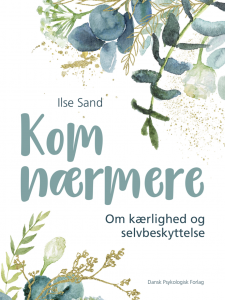The book is available in English, Chinese, Russian, French, Simplified Chinese, German, Ukrainian, Dutch, Japaneese, Korean, Turkish, Danish, Romania, Slovak and Swedish.
 The English edition
The English edition
Publisher: Jessica Kingsley Publishers.
Title: Come Closer – On love and self-protection
May 2017
Buy the book
 The Simplified Chinese edition
The Simplified Chinese edition
Publisher: Rentian Wulusi Culture Developement co.
July 2020
Buy the book
 The Dutch edition
The Dutch edition
Publisher: Panta Rhei Publishers
Title: Kom dichterbij
Over liefde en zelfbescherming
April, 2020
Buy it here
 The French edition
The French edition

Publisher: Guy Trédaniel.
Title: Hypersensibles : L’amour et les relations aux autres
January 2019
Buy it here
 The Japanese edition
The Japanese edition
Publisher: Discover21
September 2017
 The Russian edition
The Russian edition
Title: Страх близости: Как перестать защищаться и начать любить
Publisher: Alpina
March 2017
Buy the book
 The Taiwanese edition
The Taiwanese edition
Publisher: Crown Culture
August 2018
 The Korean edition
The Korean edition
Publisher: Influential
October 2018
Buy the Book here
 The German edition
The German edition
Title: Die innere Mauer
Beziehungsangst überwinden, Nähe zulassen
Publisher: C.H.Beck.
September 2020
Buy the book
 Turkish edition
Turkish edition

Publisher: Sola Unitas Academy
October 2021
Buy the book
 The Ukrainian edition
The Ukrainian edition
Publisher: Family Leisure Club
Spring 2020
Buy the book
 The Slovak edition
The Slovak edition
Publisher: Citadella Publishing.
Title: Zblíženie.
O láske a sebaochrane
December 2019
Buy the book
 The Swedish edition
The Swedish edition
Title: Kom närmare – om kärlek, relationer och försvarsstrategier
Publisher: Libris.se
April 2014
Buy the book
New edition september 2018
 The Danish edition
The Danish edition
Buy the book
Title: Kom nærmere – om kærlighed og selvbeskyttelse. (Come Closer – On love and self-protection)
Publisher: Dansk Psykologisk Forlag
Januar 2013

Publisher: Editura ASCENDENT
Title: Vino mai aproape: despre iubire si auto-protectie
November 2019
Buy the book
About the book
Why don’t we all live in vibrant, loving relationships with other people? Why do so many people live alone or in relationships that lack closeness and a genuine concern for one another?
There may be different answers to this. One of them is that we use self-protection strategies to trick ourselves and trip ourselves up in love.
If you are not able to get in touch with your feelings or if you have difficulties in establishing a warm and genuine connection to a partner, parents, children or friends, it might be because you are using self-protective strategies that you are not aware of.
A self-protective strategy could be to make light of your own wishes and only focus on other people’s needs. Or it could be that you only show positive interests in people who are out of reach while you are preoccupied with faults and problems when your partner or a possible lover is right in front of you.
In this book, I describe how self-protection strategies arise, how they can stand in the way of good, close relationships, and how undesirable strategies can be dismantled.
I have learned how relationships can become deeper and more meaningful if we dare to be fully present in the moment in all our vulnerability, shed of unnecessary armour.
The literature on this topic in which I have steeped myself was written for professionals. However, the present book is written in more accessible language that can be read by anyone. At the same time, it is solidly anchored in recognized psychological theories and many years of therapeutic experience.
It is my hope that this knowledge, which I have seen make a difference for clients and myself, will benefit a much wider audience far beyond those who read the professional literature or are in treatment.
Anyone who works in psychotherapy is familiar with self-protection strategies. Clients use various strategies to distance themselves from other people, to avoid looking hard at their own lives, or to suppress their own inner feelings, thoughts, knowledge, or desires.
These strategies have been called different things over the years. Freud called them “defence mechanisms” (abwerf). Cognitive therapy works with the concept of “coping strategies,” which sometimes describes the same observations.
Even Søren Kierkegaard, who formulated his ideas more than half a century before Freud, noticed the phenomenon. He wrote that human beings have a peculiar ability to muddle up their own knowledge. How they actually do that Kierkegaard did not dwell on. We know more about it today.
Self-protection is good if it allows you to distance yourself from your feelings when they become overwhelming. But this same self-protection strategy can become a problem if it is inflexible and allowed unconsciously (either entirely or only partially) to take on a life of its own.
Our quality of life and our vitality are affected when we create more distance to our inner lives than is necessary. And when we distance ourselves from the realities of our actual life situation, we do not see them clearly, and our lives become difficult to navigate.
One self-protection strategy, for example, may be using your imagination to reshape external reality, so you see yourself, other people, or your opportunities as better or worse than they realistically are. Another, more concrete example may be when you fail to breathe deeply enough really to feel yourself.
A self-protection strategy is a tactic that was once a shrewd solution to a difficult situation. If you needed to resort to many self-protection strategies in childhood, you may find yourself as an adult so wrapped up in your own self-protection that it is impossible to achieve good emotional contact with yourself or others. And, in this way, you may miss out on the inner blossoming that a loving connection can awaken.
It is my hope that this book will stimulate you as a reader to look at your own self-protection strategies and to consider whether your life might become richer if you abandoned one or more of them, so you can get closer to yourself, to your life, and to other people – and get more enjoyment out of your life while you are here.
The author is a practising psychotherapist MPF and former parish priest.
Review of the Book.
“Thoroughly engaging and thought provoking. I dare say this book has the power to change your life. I read the complete book in one go because when you start reading you are unable to stop. You keep discovering new things about yourself and the need to know supersedes the need to take a break. I loved that about this book.
The author explained the concepts too well with words like ‘right one’, ‘good enough’, ‘find five mistakes’ strategy etc. The real life accounts of her clients were so shocking and at times bone chilling. I could completely relate to her concept that we all have been damaged to greater or lesser goods. No one is perfect and we need to stop idolizing people around us and restrain from finding faults in ourselves.
This book can definitely teach you a thing or two about how to swim in life currents and come out victorious. Wonderful book and a must read if you are interested in discovering the psychological side of yourself.”
from Goodreads.com













